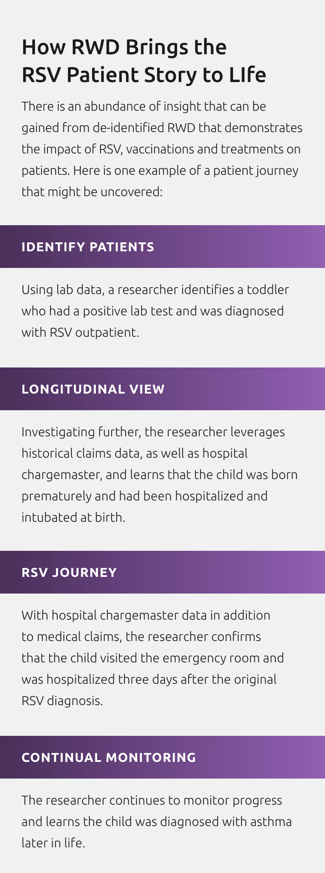With the surge in RSV cases that plagued our nation’s children at record levels this fall and over 100,000 young children and senior adults being hospitalized from the virus each year, there is an urgent need to bring the 15 vaccination and treatment options in the phase 2 and 3 development pipeline to market quickly and protect vulnerable populations.1 Real-world data (RWD) can serve as a catalyst, accelerating this research.
As a leader in the exchange of RWD with the nation’s largest healthcare and consumer data ecosystem, HealthVerity has assembled a research-ready cohort of 1.6 million patients diagnosed with RSV over a 32-month period that includes 205,000 RSV-related hospitalizations and lab data for more than 544,000 RSV patients in this same time frame. This ready-made RWD cohort can be applied to a variety of use cases, saving researchers and the public valuable time and resources:

Discover Clinical Trial Sites and Participants with Ease and Efficiency
With this pre-assembled cohort of RSV patients researchers can quickly see trends in disease spread, physicians treating the condition, and patients who meet their specific inclusion and exclusion criteria. The extensive lab data that HealthVerity is able to provide due to our unique position, bringing together the most robust lab result offering through Labcorp and Quest Diagnostics, allows researchers to paint a highly accurate and near real-time picture of infection rates. This helps sponsors to easily select ideal trial sites, recruit optimal participants and identify appropriate physician partners.
Bring Trial Participants’ Journey to Life
Using our advanced identity resolution technology, researchers can accurately link trial participants to the RWD RSV cohort, while maintaining privacy. This provides a longitudinal view of the patient journey, enabling discovery of information from before or during the trial, such as comorbid conditions, urgent care visits, and other insights on efficacy and adverse effects.
Quickly Conduct Control Arm or Concurrent Studies
This robust cohort of already assembled RSV patients allows sponsors to establish synthetic control arms or concurrent safety studies in record time. This helps researchers rapidly respond to new questions that arise or changes in care and contextualize their studies.
Future Proof Studies for Continual Monitoring
With trial participants linked to the HealthVerity data ecosystem and our ongoing updates to the assembled RSV cohort, researchers can continue to monitor safety and efficacy after a product is in market. This allows sponsors to connect the dots between diagnosis, drug usage and inpatient activity to better understand outcomes associated with their product.
Protect Public Health with Ease
The influx of RSV cases we saw early on this season reinforces the importance in understanding disease spread. The comprehensive HealthVerity RSV dataset can be used by government agencies and public health officials to easily model the spread of RSV to predict disease outbreaks and monitor patterns in outcomes post-RSV.
The Building Blocks to Controlling RSV
With an average of 58,000 to 80,000 children under age five being hospitalized by RSV each year and cases on the rise, it is important to quickly develop vaccination and treatment options.1 The robust RSV dataset that HealthVerity has assembled provides a comprehensive longitudinal view of the patient journey accumulated from a diverse variety of sources, including open and closed payer claims, electronic medical records, vaccine data from pharmacies, labs and hospital records. This, coupled with the HealthVerity IPGE platform, based on the foundational elements of Identity, Privacy, Governance and Exchange, provides the building blocks needed to accelerate RSV research and control the rapid spread of RSV.
Schedule a demo to learn more about the HealthVerity RSV dataset.
- Centers for Disease Control and Prevention. RSV Research & Surveillance. https://www.cdc.gov/rsv/research/index.html.






